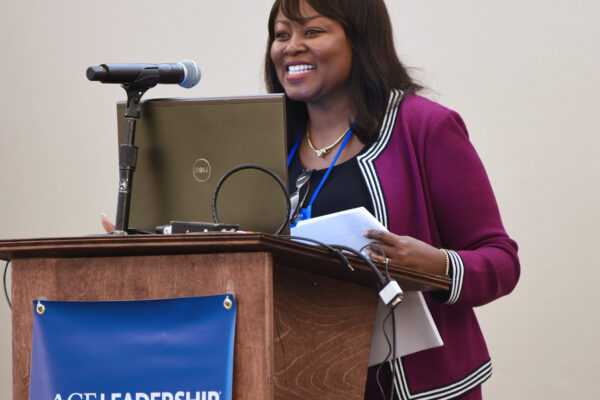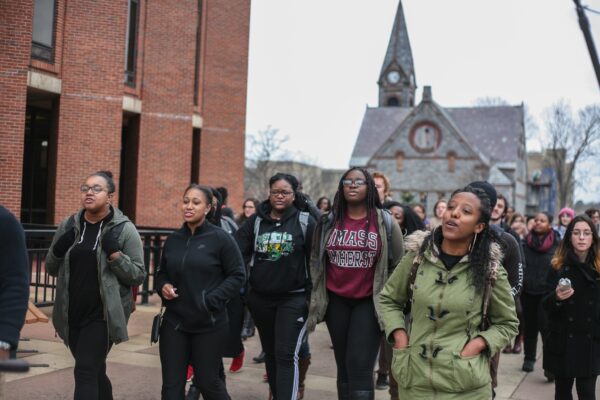Nicole Stokes DuPass considers the importance of presidential sponsors to the ACE Women’s Network state chapters.
Engaging presidential sponsors is vital to the long-term strategy and success of the ACE Women’s Network, which is composed of state networks that work on a local level to help advance and support women in higher education.
The particulars of how, when, and how often to engage presidents in this work vary and are highly dependent on the culture of the institutions and network members. Despite this variability, it is important to pay attention to the critical role of presidential sponsors in cultivating and sustaining the leadership pipeline for future higher education leaders.
A Strategic Approach
The Pennsylvania ACE Women’s Network (PA ACE) is tasked with identifying women leaders, developing their leadership abilities, encouraging them to use those abilities, advancing women’s careers, linking them to other women and mentors, and supporting women in mid- and executive-level positions throughout their careers.
After a seven-year period of inactivity, PA ACE was reorganized and revitalized in summer 2015. The Commonwealth of Pennsylvania is rich with the number and diversity of colleges and universities in our state. It was essential for us to establish a regional structure for our leadership to sustain our momentum and continue participation with the network system. PA ACE currently consists of four regions—Philadelphia Metro; Southeastern PA, Central PA, and Western PA—each with a regional coordinator who provides leadership for the institutional representatives (about 20–25) in her region and serves as a voting member of the state executive board. Our executive board also consists of our officers (president, vice president, treasurer, and secretary) and two to three at-large board members representing each of the four regions.
This regional structure achieves several key objectives for PA ACE: first, it allows our members to stay within a 45-minute to one-hour travel distance to attend PA ACE events within the region. We currently host a minimum of two events (fall and spring) in each of the four regions. Providing consistent programming in each region was a major focus of our first strategic plan and has led to significant institutional membership growth and member participation. Second, a regional model provides a built-in structure for leadership succession where the institutional representatives within a region can move up to serve as either executive board members at-large representing their region or serve as the next regional coordinator. Third, one of the network’s strategic goals was for each of the four regions to have a presidential sponsor to work directly with both the state chairperson and the regional coordinator and to lend her or his expertise, mentorship, and profession network to the region.

A Recipe for Success
In addition to geography, experience, and expertise, the network wanted our presidential sponsors to reflect our diversity of institutional types and demographics within the state and among the constituents our institutions respectively serve. PA ACE is honored to have four distinguished presidential sponsors: Thomas J. Botzman, president of Misericordia University (Region 3); Jenifer S. Cushman, chancellor of Penn State Beaver (Region 4); Mary C. Finger, president of Seton Hill University (Region 4); and Kathleen Owens, president emerita of Gwynedd Mercy University (Regions 1 and 2).
Each of our presidential sponsors has engaged with the state network in diverse and significant ways. Our executive board and PA ACE members have benefited in the following ways from leveraging the experience and expertise of our presidential sponsors.
Board Professional Development
College and university presidents have a wealth of knowledge to share about institutional governance structures and best practices. Our presidential sponsors have shared strategies for working with boards and advice for mid-career professionals on how to gain these opportunities and skills.
Leadership and Mentoring Sessions
Our presidential sponsors have given the executive board access to their professional network of other area presidents and senior leadership professionals who have served as keynote speakers for PA ACE events. We recently hosted a presidential panel event where two newly appointed women presidents led a candid discussion about how to cultivate effective and sustained relationships with mentors and sponsors as mid-career women to continue their journey to the presidency. This event was well attended by new and existing PA ACE members and provided the panelists an opportunity to share their expertise with a new audience.
At our second Annual State Leadership Conference and Retreat at Cabrini University, our most recent presidential sponsor, Thomas J. Botzman, gave a rousing opening keynote address in which he challenged women leaders to “invite themselves to the party” when seeking out leadership development opportunities and professional sponsors. Botzman’s keynote highlighted his leadership participation with the ACE Fellows Program and his long-standing practice of being extraordinarily generous with developing and cultivating opportunities for women and other underrepresented leaders. He concluded his remarks with an offer to personally mentor any PA ACE member who wanted to learn more about the Fellows Program and about leadership development.
Strategic and Succession Planning
Our presidential sponsors are chief executive officers of their institutions and work to offer sage and critical counsel to the state chairperson and the network executive board on effective strategies for growth and cultivating the future leadership of the network.
One example is Kathleen Owens, former president of Gwynedd Mercy, who was the keynote speaker at our first executive board retreat at Bucknell University in 2016. At that event, Owens shared her professional and personal journey to the presidency—she was generous and candid with her story and highlighted the unique challenges that women leaders face with professional and personal life balance. Her advice was extremely timely and well received by our board members, many of whom are grappling with achieving balance and next professional steps in their own lives.
Owens has been a wonderfully supportive mentor to me and to many others in the network. She was our first presidential sponsor when the network revitalized in 2015, attending every monthly board meeting. She served as our presidential sponsor emerita for a year after her retirement to ensure succession planning and the on-boarding of our newer presidential sponsors. She is a prime example of a servant-leader and is inspirational to me in many ways, personally and professionally. When I was considering seeking a presidency, Owens was one of the first people I consulted. I regularly seek her advice.
Access to Mentoring and Continued Leadership Development
Presidential sponsors can provide access to their cabinet members and senior leadership team for shadowing and mentoring opportunities for network members to grow their skills and leadership. For example, one of our presidential sponsors connected one of our board members to her vice president for advancement; the board member who wanted to gain exposure to development and advancement was able to shadow this leader for the day. In addition, presidential sponsors can leverage their influence to help the state network increase its reach.
One of the critical challenges for Pennsylvania (and many other large states) is our geography. We are extremely fortunate to have two strong presidential sponsors in our Region 4, which is located in the western part of the commonwealth. Jenifer Cushman, chancellor of Penn State Beaver, and Mary C. Finger, president of Seton Hill University, have grown our membership presence in the west in many critical ways. Both of our presidential sponsors have made leadership development via PA ACE a valued activity at their respective campuses. Colleagues from both institutions have hosted and supported PA ACE leadership events and several members from their respective institutions currently serve in leadership positions within the network.
Looking Forward and Continuing Our Reach
Reflecting on the past three years, PA ACE has achieved the majority of the objectives outlined within our first strategic plan. This could not have been accomplished without the dedication of our presidential sponsors, executive board, and membership. This summer, we began outlining our next three-year strategic plan, in which presidential sponsors will serve as key elements of our continued growth and success as a state network. To achieve more diverse institutional representation within PA ACE, we hope to engage one of our community college presidents to serve as another presidential sponsor and continue to have our leadership reflect the landscape of our membership.
If you have any questions or comments about this blog post, please contact us.


